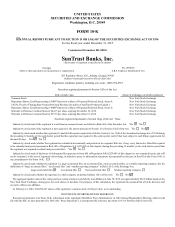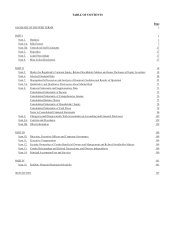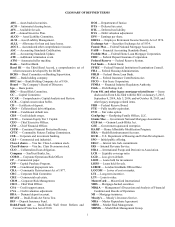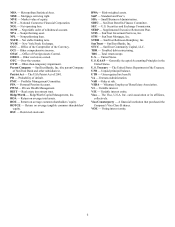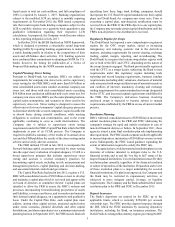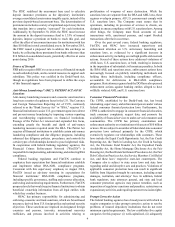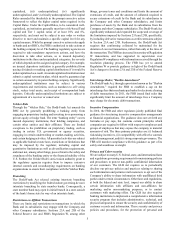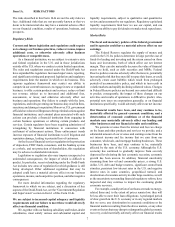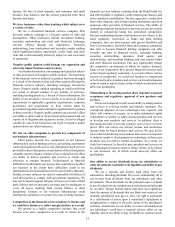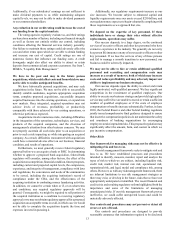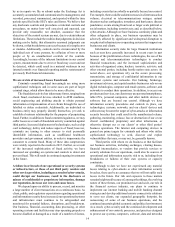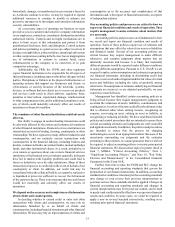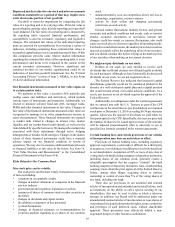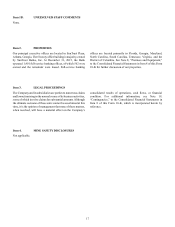SunTrust 2015 Annual Report Download - page 35
Download and view the complete annual report
Please find page 35 of the 2015 SunTrust annual report below. You can navigate through the pages in the report by either clicking on the pages listed below, or by using the keyword search tool below to find specific information within the annual report.7
Item 1A. RISK FACTORS
The risks described in this Form 10-K are not the only risks we
face. Additional risks that are not presently known or that we
deem to be immaterial also may have a material adverse effect
on our financial condition, results of operations, business, and
prospects.
Regulatory Risks
Current and future legislation and regulation could require
us to change our business practices, reduce revenue, impose
additional costs, or otherwise adversely affect business
operations or competitiveness.
As a financial institution, we are subject to extensive state
and federal regulation in the U.S. and in those jurisdictions
outside of the U.S. where we conduct certain limited operations.
The rules and regulations enacted under the Dodd-Frank Act
have expanded this regulation. Increased supervision, reporting,
and significant existing and proposed legislation and regulatory
requirements limit the manner in which we do business. This
rigorous regulatory framework may restrict our ability to
compete in our current businesses; to engage in new or expanded
business; to offer certain products and services; reduce or limit
our revenue; subject us to increased and additional fees,
assessments, or taxes; and otherwise adversely affect our
business and operations. Our failure to comply with the laws,
regulations, and rules governing our business may result in fines,
sanctions, and damage to reputation. Moreover, U.S. government
officials have shown willingness to bring criminal actions against
financial institutions, and criminal pleas associated with such
actions can preclude a financial institution from engaging in
certain business operations or offering certain products and
services. Certain regulators have been requiring admissions of
wrongdoing by financial institutions in connection with
settlement of enforcement actions. These enforcement trends
increase exposure of financial institutions to civil litigation and
reputation damage, leading to potential loss of customers.
As the focus of financial services regulation is the protection
of depositors, FDIC funds, consumers, and the banking system
as a whole, and not protection of shareholders, this regulation
may be adverse to shareholder interests.
Legislation or regulation also may impose unexpected or
unintended consequences, the impact of which is difficult to
predict. In particular, recent rulemaking under the Dodd-Frank
Act includes new areas of regulation for which guidance is still
being developed. Other additional regulation that may be
adopted could have a material adverse effect on our business
operations, income, and competitive position, and other negative
consequences.
For more detailed information regarding the regulatory
framework to which we are subject, and a discussion of key
aspects of the Dodd-Frank Act, see the “Government Regulation
and Supervision” section in Item 1 of this Form 10-K.
We are subject to increased capital adequacy and liquidity
requirements and our failure to meet these would adversely
affect our financial condition.
We, together with our banking subsidiary and broker-dealer
subsidiaries, must satisfy various and substantial capital and
liquidity requirements, subject to qualitative and quantitative
review and assessment by our regulators. Regulatory capital and
liquidity requirements limit how we use our capital, and can
restrict our ability to pay dividends or to make stock repurchases.
Market Risks
The fiscal and monetary policies of the federal government
and its agencies could have a material adverse effect on our
earnings.
The Federal Reserve regulates the supply of money and
credit in the U.S. Its policies determine in large part the cost of
funds for lending and investing and the return earned on those
loans and investments, both of which affect our net interest
margin. They can also materially decrease the value of financial
assets we hold, such as debt securities and MSRs. Federal
Reserve policies can also adversely affect borrowers, potentially
increasing the risk that they may fail to repay their loans, or could
adversely create asset bubbles which result from prolonged
periods of accommodative policy, and which in turn result in
volatile markets and rapidly declining collateral values. Changes
in Federal Reserve policies are beyond our control and difficult
to predict; consequently, the impact of these changes on our
activities and results of operations is difficult to predict. Also,
potential new taxes on corporations generally, or on financial
institutions specifically, would adversely affect our net income.
Our financial results have been, and may continue to be,
materially affected by general economic conditions, and a
deterioration of economic conditions or of the financial
markets may materially adversely affect our lending and
other businesses and our financial results and condition.
We generate revenue from the interest and fees we charge
on the loans and other products and services we provide, and a
substantial amount of our revenue and earnings come from the
net interest income and fee income that we earn from our
consumer, wholesale, and mortgage banking businesses. These
businesses have been, and may continue to be, materially
affected by the state of the U.S. economy. Although the U.S.
economy has continued to gradually improve from severely
depressed levels during the last economic recession, economic
growth has been uneven. In addition, financial uncertainty
stemming from low oil and commodity prices, a strong U.S.
dollar, U.S. debt and budget matters, significant central bank
stimulus, persistent low interest rates in the U.S. and negative
interest rates in some countries, geopolitical turmoil, and
deceleration of economic activity in other large countries, as well
as the uncertainty surrounding financial regulatory reform, have
impacted and may continue to impact the continuing global
economic recovery.
For example, a small portion of our loans are made to energy-
related firms and, to the extent oil prices remain low, they will
be less able to meet their loan obligations. A prolonged period
of slow growth in the U.S. economy or in any regional markets
that we serve, any deterioration in economic conditions or the
financial markets resulting from the above matters, or any other
events or factors that may disrupt or dampen the global economic
recovery, could materially adversely affect our financial results


